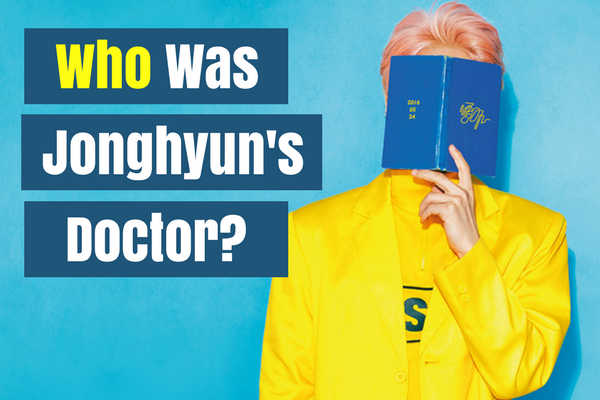Who was the doctor mentioned in Jonghyun’s suicide letter? The answer is a bit more complicated than a name.

Who was that doctor Jonghyun mentioned in his suicide letter? I am sure that this was a question that crossed everyone’s mind when they read Jonghyun’s public letter, which was first translated by Allkpop. The letter was lengthy, dark, and pained filled — but even more so enlightening.
Posted on Instagram by his close friend Jang Hee-yeon from the group Dear Cloud, Jonghyun details his fight against depression and an alarming startlingly conversation with a doctor. “I’m hurting because of me. It’s all my fault and because I’m bad. Doctor, is this what you wanted to hear? When the doctor blamed my personality with a quiet voice,” he wrote, “I thought it was so easy to be a doctor.”
This revelation is startling and upsetting. Once Jonghyun finally made the decision to get help and come forward about his depression he was blamed for his condition. Further, it needs to be noted that this event was significant enough for Jonghyun to mention it in his suicide letter.
In my mind, there is no doubt that the assessment made by this doctor is wrong — and honestly — should be considered malpractice. An opinion that I apparently share with Dr. Kim Hyun-chul, the doctor who first appeared on “Infinity Challenge”, publically diagnosed Yoo Ah-in, and eventually deleted his Twitter after posting a critique of Jonghyun’s doctor.
In the twitter post he wrote, “ 1) I can’t recognize that doctor as my colleague, 2) The trauma (from the given diagnosis) is worse than ‘exercise/ get some sun,’ 3) And at times like this too, they (Korean Psychological Association) don’t make any official announcement.” I agree that the association needs to come out publicly denouncing the diagnosis as ignorant and wrong. However, although the points made in the posts were pertinent, Dr. Kim Hyun-chul later deleted his Twitter account after received a negative backlash from the situation.

Many accused him of stirring-up controversy during a tragedy, while others believed he was seeking attention. But what better time to put the spotlight on something like this? When someone in the U.S. dies because of police brutality, should the police not be called out for taking an innocent life? But I digress. The questions here are: who was Jonghyun’s doctor? And arguably more important, what were the conditions that created Jonghyun’s doctor and made his diagnosis possible? I don’t know the answer to the first question and don’t plan to find out — there will be no doxing here. However, for the second question, there are quite a few factors to consider. The first factor on the list is the definition of depression.
Depression Defined
Unless you suffer from a form of depression and have also done research, depression is hard to conceptualize. Moreover, the medical definitions for depression are often vague and general. For instance, the U.S. National Institute of Mental Health defines it as a “serious mood disorder” that “affects how you feel, think, and handle daily activities, such as sleeping, eating, or working.” Likewise, Mayo Clinic does not provide a primary definition at all and instead focuses on levels of depression and provides a list of signs and symptoms. The American Psychiatric Association shares the same definition as the Institute of Mental Health.
Where Is the Money?
Besides these vague definitions, there is also a lack of government funding for the research and development (R&D) of depression, effective treatment, and training for psychological doctors. According to the article “Mental health services and R&D in South Korea,” published in the International Journal of Mental Health Systems on June 6, 2016, the South Korea’s government investment in national mental health research and development (R&D), specifically in the areas of the assessment and standardization of medical professionals and therapies, is sorely lacking.
Between 2008 and 2012 about 5.3 percent of the annual budget was dedicated to this sector. Subsequently, the budget for R&D in this area can means that in practice the training and selection of doctors are likely outdated and insufficient in this area. On another note, out of the 2012 budget of 26.4 million USD, 4.01 million USD was spent on depression research and 1.40 million USD was dedicated to suicide research.
Consequently, this lack of funding for the training of medical professionals is evident in the Korean medical algorithm for depressive disorder, an algorithm used as a treatment guideline for depression. In a comparative analysis conducted by the U.S. National Institution of Mental Health, this algorithm was compared to other recently published guidelines from around the world.
The findings are fascinating. Interestingly, the first line of treatment is a prescription of an antidepressant. If the initial antidepressant does not work, another is prescribed. Moreover, depending on the severity of the depression and other factors, a second antidepressant is prescribed in conjunction with the first. More, an antipsychotic drug can be recommended.
Should a patient be suicidal, “electroconvulsive therapy (ECT) is recommended as the first-line treatment for severe depression with acute suicide risk, regardless of the presence of psychotic features.” More, “for nonpsychotic severe depression, ECT is considered for second-line treatment when two antidepressants fail to show complete response.”
Additionally, no treatment through psychotherapy, commonly known as talk therapy, is mentioned. While this can just be a product of the studies’ focus, there is also a possibility that, as mentioned in this article by the New York Times, psychotherapy is not mentioned due to its slow to be acceptance and development in South Korea.
South Korean Society and Mental Health
Part of this slow acceptance and development can be attributed to Buddhist and Confucian values that underpin South Korean society. Due to these historic values, there is a continued emphasis on stoicism, modesty, diligence and hierarchy where individual concerns are secondary to “preserving face” and dignity of the family or the community.
As a result, mental health issues and seeking out psychotherapy can be considered contrary to these beliefs. Dr. Jin-hee, a Korean-American mental health profession, elaborated on this issue in an interview with Forefront. She said, “In Korea, there is no such thing as mental health. One is seen as ‘weak’ if they have a mental health issue. People with mental health issues are seen as ‘crazy’ and the issue is something that must be overcome [emphasis added].”
The end of the quote is emphasized because the sentiment expressed can help explain a possible motivation for the assessment. Jonghyun’s doctor made. The doctor saw a depressed and immensely popular and successful singer who was certainly under a lot of stress. And instead of recommending medication, unless Jonghyun was already on antidepressants or psychotherapy, they wanted to downplay the situation. Possibly make it so that Jonghyun believed that it was something that he could overcome by just making a few adjustments.
Really, Jonghyun’s doctor — a person born in a society that still stigmatizes mental health and is underpinned by the importance of the whole over the individual; a person that may not have received the best training and understanding of depression because of a poorly-funded system for the research and development of mental health and its treatments — made the decision to tell Jonghyun that it was his personality. That is who Jonghyun’s doctor is. And that is how a bad diagnosis was made.
However, regardless of the motivating factors for the assessment, at the end of the day a life was lost. A life that perhaps, would still be here if he had gotten meaningful and effective help and support from his doctor, friends, and family. Help that would build a pathway to understanding, coping, and healing.
As such, I think we need to make a resolution concerning depression and suicide. We need to resolve to NOT be like Jonghyun’s doctor. So when, like in the wake of Jonghyun’s suicide, messages are posted offering support or an open ear, we need to make sure that those conversations do not go the way as the one mentioned earlier in this article. As much as I admired the posts made after Jonghyun’s death offering help through conversation, we all know that the contents of these conversations can very well end up going downhill.
Let us resolve not to make the same mistakes and arm ourselves with the knowledge, empathy, kindness, and love to care for someone in their darkest hour. But, at the same time, also take a hard stance to lead them to help whether that be trusted therapists or other medical institutions – we need to know when to do this. There should be no Googling the “sign of depression” or finding a “wiki-how” on dealing with suicidal behavior when it is already happening. Now is the time to learn and educate ourselves. Let’s start now.
By O.C
The writer’s opinions are their own and do not reflect the views of Kpoplove.





![[TEASER] Taeyeon Releases Video Teaser for Her Single ‘Four Seasons’](https://kpoplove.koreadaily.com/wp-content/uploads/2019/03/maxresdefault-14-218x150.jpg)
![[M/V] Baek Yerin Ends 2-Year Hiatus with ‘Maybe It’s Not Our Fault’](https://kpoplove.koreadaily.com/wp-content/uploads/2019/03/sddefault-2-218x150.jpg)
![[M/V] Red Velvet Yeri Releases New Song ‘Dear Diary’ on SM Station](https://kpoplove.koreadaily.com/wp-content/uploads/2019/03/maxresdefault-13-218x150.jpg)
![[HOT CLIP] Park Bom Performs ‘Spring’ Live for the First Time at Showcase](https://kpoplove.koreadaily.com/wp-content/uploads/2019/03/maxresdefault-12-218x150.jpg)





![[HOT CLIP] Actor Jung Hae-In Sweetly Accepts Fans’ Gifts at Airport](https://kpoplove.koreadaily.com/wp-content/uploads/2019/01/ARTICLES-2-10-218x150.png)
